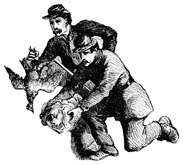Our lexicographer considers terms coined during the Civil War.
The Civil War was one of the deadliest conflicts in history. Some 620,000 troops died, an estimated two-thirds from disease rather than combat. This number represented about 2 percent of the American population, and far more than the casualties of any previous conflict of the United States. It is not surprising, therefore, that several of the terms born during that conflict incorporate the word “dead.”
The noun deadline, meaning a limiting mark or time or line, was coined at the infamous Confederate prisoner-of-war camp Andersonville. The first written record of the word appeared in an 1864 report by Col. D. T. Chandler and was later incorporated into the Congressional Record. It read: “The Federal prisoners are confined within a stockade fifteen feet high. A railing around the inside of the stockade, and about twenty feet from it, constitutes the ‘dead line,’ beyond which prisoners are not allowed to pass.” A prisoner who crossed this line was summarily shot.
After the war, the term survived in a number of different contexts. In the American West, cattle ranchers used it to keep sheepherders from competing for their pastures. A sheep farmer who took his flock beyond a certain point, the deadline, could be shot. In New York City in 1880, Police Inspector Thomas Byrnes designated an “official” deadline at Fulton Street. Any professional swindler known to the police would be arrested if seen south of this deadline. By 1909 the term was already used more figuratively, as by O. Henry who wrote of “crossing the dead line of good behavior.”
Today a deadline primarily means a time when a book or other project must be completed, or when a contest entry must be received, when a coupon may be used during a special sale, or when a column like “Fighting Words” must be submitted to the editor.
Another term originating during the Civil War is deadbeat, describing a malingerer or loafer. It appears to be an intensification of beat, also meaning a loafer or sponger, a soldier who would not carry his weight. Here “dead” is used in the sense of “perfect” or “absolute,” which today survives in such terms as “dead ringer” or “dead giveaway.” The term appears in numerous writings of the time, by Walt Whitman and others. But after the war it was broadened to mean simply a worthless person, as in George Peck’s Peck’s Bad Boy (1883): “I know more than some of the dead beats that lay around the court to get on a jury.”

A word with a similar meaning in the military is bummer, used not only for a malingerer or loafer but also for a straggler or deserter. In the 1850s, it simply denoted a shiftless person, but it acquired its more nefarious meanings during the Civil War. Then it was used to describe a person safe in the rear, such as a cook or member of the medical staff, but it also was applied to a forager, a soldier who left the ranks and plundered, either alone or as part of a raiding force. Perhaps the most notorious were Sherman’s bummers, stragglers who robbed civilians and vandalized property during Sherman’s 1864 March to the Sea. Some were foraging to supply the Union army, but others were simply deserters taking advantage of the chaos produced when an army passes through a region.
Not entirely forgotten is miscegenation, another term born during the war. In 1860 there were approximately four million slaves in the United States, most of them in the Southern and border states. From the very beginning, when black slaves were first brought to America, there had inevitably been sexual contact between them and whites. But it was during the Civil War that a word for it was coined, in a 72-page pamphlet called Miscegenation: The Theory of the Blending of the Races, Applied to the American White Man and Negro, published anonymously in 1864. The word miscegenation was formed by combining the Latin miscere, “to mix,” and genus, “race.” The pamphlet, which claimed many benefits for miscegenation, was much later exposed as an incendiary hoax intended to introduce controversy into the 1864 elections.
Nevertheless, the term survived. For the next century the practice of mixing races by intermarriage or cohabitation continued to be largely frowned on. Indeed, laws prohibiting miscegenation had existed in America as early as 1661. It was only in 1967 that the Supreme Court ruled such laws to be unconstitutional. In recent decades, the term has lost much of its sense of opprobrium, and in 2008 a majority of voters elected the offspring of an interracial marriage, Barack Obama, to lead the United States.
To end on a more benign note, the motto “In God We Trust” was first authorized by the United States Congress in 1864 for a two-cent bronze coin. The coin is long gone but the slogan survives on two present-day coins, the nickel and the penny. MHQ
Christine Ammer is the author of several dozen wordbooks, including The American Heritage Dictionary of Idioms (2004).





